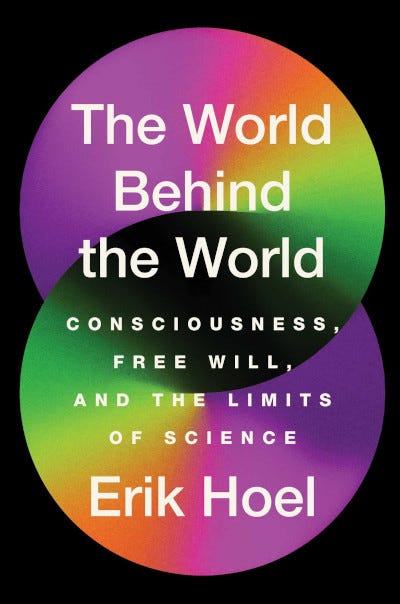Review: The World Behind the World, by Erik Hoel
Consciousness, Integrated Information Theory, Gödel, causal emergence (macro beats micro), free will.
Greetings to all readers and subscribers, and special greetings to the paid subscribers!
Please scroll down for the main topic of this newsletter. But first:
VIDEO: Terasem Colloquium, July 20, 2023. Highly imaginative, long-term perspectives on space expansion and interstellar human futures. Speakers: Christopher E. Mason, Stellar Magnet, Clément Vidal, Todd A. Drashner & Trond Nilsen, Max More, Tom W. Bell.. Highlights: remaking humans with bioengineering and synhetic biology for space expansion (Mason); a social, cooperative spacefaring roadmap for the next century (Stellar Magnet); cosmic evolution, complexity, exotic vitology, cosmist values (Vidal); the magnificent collaborative science fiction universe of Orion’s Arm (Drashner & Nilsen); powerful libertarian arguments and legal/political enablers for space expansion (More & Bell).
The Terasem Journals are back! Terasem is issuing a call for papers for The Journal of Personal Cyberconsciousness Vol. 11, Issue 1 - 2023, to be published in December. The issue will be focused on Artificial Intelligence (AI) and machine consciousness.
The next Terasem Colloquium on December 14 (the anniversary of the last day astronauts have been on the Moon) will be also focused on Artificial Intelligence (AI) and machine consciousness. In the future there will be synergies between Terasem Colloquia and Journals.
My spaceflight book is now available in Italian: “Meditazioni futuriste sul volo spaziale” (2023). I’ve reviewed the translation before publication. The Italian edition has a new introduction by me and a foreword by Stefano Vaj.
Here’s my review of Stefano Vaj’s last book, titled “Intelligent Artificialities: Who Is Afraid of the Big, Bad AI - and Why” (translated from my review of the Italian edition of the book):
At last, a serious position on Artificial Intelligence. In this short but thoughtful essay, Stefano Vaj takes distance from cheap alarmist positions on Artificial Intelligence (AI). No, ChatGPT will not destroy our world (only a very weak world could be destroyed so easily), but the successors of today's rudimentary AIs will sooner or later be people, intelligent like us (or perhaps more), with whom we will have to share tomorrow this planet, and the day after tomorrow the universe. Their cosmic destiny will be our cosmic destiny, and this should fill us with pride rather than fear.
This essay offers a concise introduction to AI without too much technical detail. But what I found most interesting is the answer to the question formulated in the title: Who is afraid of the spread of AI and why? Vaj's answer, which I find not only plausible but almost obvious, is that the incumbent powers are afraid that a widespread diffusion of AI could prevent them from controlling public opinion. They are right on this point, and Vaj is right on the rest.
“The World Behind the World: Consciousness, Free Will, and the Limits of Science” (July 2023), by Erik Hoel, is the book I most wanted to read this summer. I attacked the book ferociously on publication day and read it twice, cover to cover, in a couple of days of total immersion.
I first encountered Hoel’s work in “The Demon in the Machine” (2018), by Paul Davies. Davies explains:
“Tononi’s integrated information theory shows that not only is a higher-level description simpler, but higher-level systems can actually process more information than their components. This counter-intuitive claim has been investigated by Erik Hoel, a former member of Tononi’s research group now working at Columbia University… His conclusion is that there can be causal relationships that exist solely at the level of agents. Counter to most reductionist thinking, the macroscopic states of a physical system (such as the psychological state of an agent) that ignore the small-scale internal specifics can actually have greater causal power than a more detailed, fine-grained description of the system, a result summed up by the dictum: ‘macro can beat micro’.”
I found this very intriguing, googled Hoel, and started following him on social media. Then I read Hoel’s debut novel (yes, he is also a novelist) “The Revelations” (2021). My review: This is the muscular and powerful debut novel of young neuroscientist Erik Hoel, a former student of Giulio Tononi of Integrated Information Theory fame. Hoel has very interesting ideas on life, consciousness, the universe and everything, and his ideas transpire from the novel. I guess the readers who haven’t done much reading on consciousness studies and theories will miss something, but since the story is good they will google and learn. The novel is a page turner with strong characters and hypnotic unforgettable scenes.
I became an avid reader of Hoel’s excellent Substack newsletter “The Intrinsic Perspective.”
“The World Behind the World” starts with the compared history of the intrinsic perspective (seeing the world from the inside) and the extrinsic perspective (seeing parts of the world from the outside). “[It] is in the modern science of consciousness that the two perspectives come to a head,” says Hoel.
Hoel describes the history and current status of the science of consciousness, then explains the basics of Integrated Information Theory (IIT). Don’t worry, he uses words and diagrams instead of complicated math. Hoel confirms the impression I had from other writings on IIT: it is more a theory of existence and causation (what it means to stand out as an individual whole in the fabric of reality and make a difference) than a theory of consciousness.

In fact, IIT is silent on the hard problem of consciousness: why and how matter gives rise to the inner experience of existence. IIT in its current form doesn’t explain why and how “certain extrinsic events, like neurons squirting chemicals at one another, necessitate an accompanying conscious experience.”
To me, the most interesting part of Hoel’s book is the chapter on scientific incompleteness. Like many thinkers including Stephen Hawking, Hoel suspects that there must be some kind of scientific incompleteness analogous to the mathematical incompleteness discovered by Gödel.
A totally precise map of a territory, placed in the territory itself, must include the map itself. But then the map in the map must include another map and so forth in a regression without end.

This sounds like Gödel. Hoel doesn’t try to convert this and similar insights into a rigorous scientific proof, but suspects that science “leaves facts about the universe on the table.”
If we conceptualize science as a great block of material, it may be riddled with holes. And from within, holes can only be identified by where the material curves, rather than the hole itself. If this conception of science is valid, then we should expect, of all things, consciousness itself to be undecidable, since it is science looking back at itself, and we know that self-reference is the surest way toward paradox.”
I tend to agree. Besides Hawking and Hoel, other great thinkers like John Wheeler, Freeman Dyson, and Rudy Rucker have put forward similar insights.
Then Hoel dives into the macro beats micro thing. His theory of causal emergence suggests that, in the presence of noise, “macroscales can have causal influence above and beyond the microscales they supervene on.” This means that the causal relations between things at a certain macroscopic scale of space and time, such as the causal relations between biological cells, can be stronger than the causal relations between quarks, electrons and all that.
According to Scott Aaronson, the theory of causal emergence “simply reiterates the usual worldview of science.” Hoel insists that the theory is new and important, and tries to argue without invoking strong emergence - the controversial idea “that new irreducible properties are added up at the macroscale.” Causal emergence is “not magic, just math,” he says.
Hoel claims that causal emergence is a middle road between weak and strong emergence: causal emergence “holds that the elements and states of macroscales are reducible to underlying microscales without loss, but that the causation of the macroscale is not.”
Causal emergence “is impossible if there is no uncertainty anywhere to be found,” but uncertainty is everywhere in science and some degree of uncertainty, for example in quantum physics, or perhaps forced by scientific incompleteness, could be irreducible and fundamental. Hoel says that “uncertainty does enable the conditions” for causal emergence.
Now, it seems to me that, if the microphysics of quarks, electrons and all that is causally closed (fully deterministic), then there’s no uncertainty and therefore no causal emergence. If there is causal emergence, then there is irreducible uncertainty, so microphysics is not causally closed and there’s enough room at the bottom for Schrödinger's “other laws of physics” to act independently without inconsistencies.
To me, this is strong emergence. So, my impression is that causal emergence is a form of strong emergence. And why not? I have nothing against strong emergence and I like Hoel’s conclusions.
However, Hoel doesn’t firmly commit to irreducible uncertainty. He also makes a case for free will in a fully deterministic but computationally irreducible universe.
Computational irreducibility (see Stephen Wolfram’s “A New Kind of Science”) means that, in many cases, predicting the future is impossible in principle because the fastest way to know what will happen in the future is waiting for the future to happen.
Hoel proposes a conception of free will based on causal emergence and computational irreducibility. I have some reservations on non-predictability as a proxy for free will, but I enjoyed reading Hoel’s clever arguments.
I sent this review to Hoel and I hope he’ll reply, watch the comments here or the comments to his post.




Concerning Giulio Tononi"s use of Φ derived from his integrated information theory to measure consciousness, Scott Aaronson makes the point that to be useful it had better correspond with our intuitive understanding of what is conscious and what is not, for example a person should have a high value, a dog a lower value, and a rock a zero or at least a very low value. However when you do the calculations it turns out that a chip for a Reed-Solomon code has an enormous Φ, much larger than any human has. Every cd player has a Reed-Solomon chip, but does anybody really believe that a cd player is more conscious than a person? After blasting Tononi's idea in a fairly long article I like the way Aaronson ended it:
"But let me end on a positive note. In my opinion, the fact that Integrated Information Theory is wrong—demonstrably wrong, for reasons that go to its core—puts it in something like the top 2% of all mathematical theories of consciousness ever proposed. Almost all competing theories of consciousness, it seems to me, have been so vague, fluffy, and malleable that they can only aspire to wrongness."
https://scottaaronson.blog/?p=1799
John K Clark